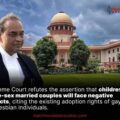
In a recent judgment delivered by a Family Court in Mumbai, it was expounded that prenuptial agreements, although not accorded legal enforceability within the framework of Indian law, remain pertinent instruments for ascertaining the intentions of the contracting parties. This elucidation underscores the court’s authority conferred by Section 14 of the Family Court Act, 1984, which vests the court with the prerogative to consider documents it deems relevant for dispute resolution, even when such documents may not meet the admissibility criteria as stipulated under the Evidence Act.
Within the context of a divorce proceeding, the court granted a divorce to a 53-year-old petitioner. In rendering this decision, the court factored in the prenuptial agreement as an indicative manifestation of the parties’ foresight regarding potential issues and their mutual predisposition to effect separation in the event of the emergence of such issues.
“The prenuptial agreement dated 11/07/2016 can be taken into consideration just to understand intention of parties. This document shows parties were in middle age. Therefore, they are anticipated few things and thereby agreed to separate mutually, if any problem arise. The present respondent had declared that she is educated, qualified and can earn and able to take care of herself if such situation arises. The above agreement shows the parties agreed to enter into partnership and it was not a relation till last breath. This was the foundation of relation”, the court said.
In the matter at hand, the petitioner, a male party, articulated his initial encounter with the respondent, his former spouse, as having transpired through a matrimonial website, culminating in their matrimonial union in 2016. Regrettably, this marital relationship proved to be of brief duration, compelling the petitioner, ably represented by Advocate Kanupriya Kejriwal, to institute legal proceedings, seeking a divorce predicated on allegations of cruelty.
The petitioner further posited that subsequent to his divorce from his antecedent spouse, he re-established contact with the respondent in 2009 through an online platform, with their association rekindling in 2012. The petitioner averred that the respondent had subjected him to emotional coercion, underlining the deteriorating health of her mother as a consequence of her unwed status. The petitioner asserted that, motivated by a sense of moral obligation as a friend, he acceded to matrimony with the respondent in July of 2016. However, the conjugal relationship swiftly deteriorated, culminating in dissolution a mere two months hence.
The petitioner proffered a litany of grievances to substantiate his plea for divorce. These grievances encompassed persistent verbal altercations, discord arising from discrepant preferences in matters of intimacy, and allegations of mistreatment of the petitioner’s mother and sister by the respondent. The petitioner further contended that the respondent abruptly vacated the matrimonial abode on September 12, 2016, taking possession of personal effects, including jewelry gifted by the petitioner’s mother. Additionally, the petitioner alleged that the respondent convened an impromptu assembly of 8 to 10 individuals, purportedly her kith and kin, at his mother’s residence in a bid to mediate the discord. The court observed such an unscheduled mediation meeting as lacking in feasibility and suggested the possible utilization of force or unsavory elements in this context.
The respondent, in her rejoinder, refuted the petitioner’s assertions and posited that the petitioner’s actions were orchestrated at the behest of his mother and sister.
The court took cognizance of the petitioner’s rationale for abstinence from conjugal relations and underscored the respondent’s failure to contest the prenuptial agreement executed antecedent to their marriage.
In light of the entire array of facts presented and a meticulous consideration of the petitioner’s predicament, the court adjudged the petitioner’s conduct as both reasonable and justifiable. Furthermore, the court cast aspersions on the respondent’s credibility, accentuating the content of WhatsApp messages that depicted the petitioner’s unwavering care and support.
Ultimately, the court concluded that the respondent’s comportment qualified as cruelty within the marital context. It opined that fundamental issues in the relationship had been inherent from its inception, leading to its protracted deterioration. In light of these considerations, the court determined that reconciliation was no longer feasible, thus rendering a verdict in favor of the petitioner, permitting the dissolution of the marriage in consonance with the provisions of Section 13(1)(i-a) of the Hindu Marriage Act, 1955.





